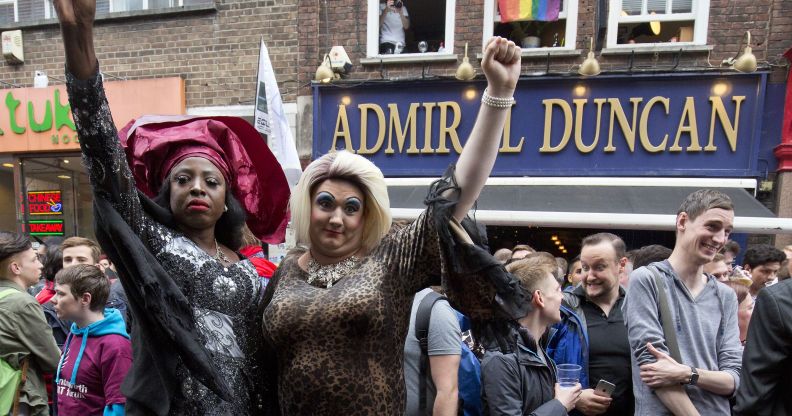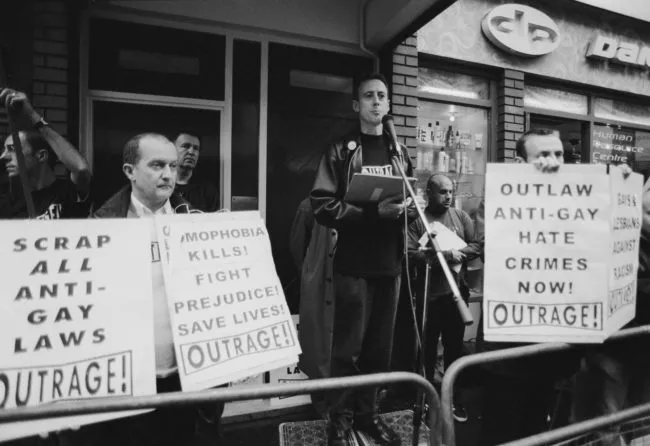Admiral Duncan nail bomb attack in Soho remembered 25 years on: ‘We will never forget’

People gather outside the Admiral Duncan pub in Old Compton Street in Soho, which was attacked with a nail bomb on April 30, 1999 (Justin Tallis/AFP/Getty)
April 30, 1999, was supposed to mark no more than the start of a bank holiday weekend, but a deadly nail bomb attack at the Admiral Duncan pub in Soho confined the date to a dark page in history for London’s LGBTQ+ community.
Three people lost their lives in the attack, and 79 more were injured. It was the third bombing in two weeks targeting vulnerable groups in the British capital—on April 17, a nail bomb exploded in Brixton injuring 47 people, and another blast took place in Brick Lane on April 24, harming six people.
Five years ago, in 2019, the campaigning group 17-24-30 NationalHCAW, which also organises National Hate Crime Awareness Week, teamed up with Pride in London to commemorate the 20th anniversary of the Admiral Duncan bombing in Soho.
Ahead of the anniversary, venues along Old Compton Street, the beating heart of London’s gaybourhood where the Admiral Duncan is located, were asked to display LGBTQ+ pride flags.
“Hate crime is just a heartbeat away for a lot of gay, lesbian, trans, bisexual people, and they face the risk and the threat of hate at any moment in their lives.”
— Ian Adams
Today (30 April 2024) marks 25 years since the tragedy; to mark the grim anniversary there is another commemoration taking place outside of the Admiral Duncan, with the London’s Gay Men’s Choir performing.
London’s Metropolitan Police also paid tribute to the victims:
As did many others, including Brighton drag queen Stephen Richards, who tweeted: “25 years ago today when David Copeland bombed the Admiral Duncan injured 79 people & killed John Light, Nik Moore, Andrea Dykes & her unborn child. We will never forget & always stand against hatred towards the LGBTQ+ community.”
The person responsible for the bombings was arrested in May that year and later condemned to six life sentences—organisers of the commemoration asked for his name to be withheld from publication to prevent him from achieving his goal of being immortalised for the attacks.
A far-right fanatic who was 23 years old at the time of the attacks, he had picked the locations for the attacks on the basis of their association with the black community, the Asian community and the LGBTQ+ community.
The victims of the Admiral Duncan attack were 27-year-old Andrea Dykes, who was pregnant with her child, her friend Nik Moore, 31, and her husband’s best man John Light, 32.
David Morely, affectionately known as Sinders in the community, survived the bombing at the Admiral Duncan where he worked as a bartender, but was killed in a homophobic beating on the South Bank on October 30, 2004 by a group of teenagers. Thomas Douglas, another survivor of the attack, who passed away in 2017.
Remembering the Admiral Duncan nail bomb Attack in Soho 25 years later
Westminster councillor Ian Adams had gone out to Soho the evening of the attack, approaching Old Compton Street a few minutes after the bomb exploded shortly after 6.30pm.
“There was a lot of disruption of the roads and some of the roads were closed and there was police tape towards the end of Old Compton Street. There was a certain eeriness about the place. There was no panic and there were a lot of people milling around,” he tells PinkNews.
“I think the community was just there together as one and wanting to provide reassurance to one another that people were alright,” he recalls. “This is a very extreme case of hatred being played out on our streets but I’m very very conscious that today, hate crime is just a heartbeat away for a lot of gay, lesbian, trans, bisexual people, and they face the risk and the threat of hate at any moment in their lives.”

LGBTQ+ campaigner Peter Tatchell tells PinkNews he was “stunned but not surprised” by news of the attack.
“After the bombings of the black and Asian communities, I had been warning that the bomber was probably a far right extremist who might attack LGBT+ venues. Together with my OutRage! colleagues, I had been urging gay bars to conduct bag searches. The police initially dismissed our concerns—[they] accused us of ‘scaremongering,'” he says.
OutRage! activists were among those who organised the first commemoration of the bombings’ victims, a week following the attack, demanding tougher action to combat anti-LGBTQ+ hate crimes.
“The highlight was the public premiere of Holly Johnson’s moving new single, ‘The Power of Love.’ It bought tears to my eyes,” Tatchell recalls.
“There is no room for complacency, with the rise of far right and Islamist extremism.”
— Peter Tatchell
Mark Healey, Founder of 17-24-30 NationalHCAW, said in a statement: “It’s hugely important that our communities come together to mark the anniversaries of these horrendous events. We have a duty to remember those we lost, to show our ongoing support to those affected by these attacks, and most importantly to educate the next generation to make sure these kinds of attacks never happen again.”
Tatchell too emphasised the importance of commemorating the event to raise awareness of the struggles the LGBT+ community has faced and continues to face.
“It is vital that young LGBTQ+ people know the history of our persecution and our struggle to overcome it,” he says. “There is no room for complacency, with the rise of far right and Islamist extremism. A similar terrorist attack could happen in the future. There are still fanatics who hate us.”
“We’re good at dealing with the immediate aftermath of these kinds of attacks but more needs to be done to deal with their longer-term impact on our communities.”
— Mark Healey
Healey also called for more support for the victims of hate crime.
He said: “We’re good at dealing with the immediate aftermath of these kinds of attacks but more needs to be done to deal with their longer-term impact on our communities.
“Some of the survivors and the families affected by these attacks are still suffering and need more support. I hope our April Acts of Remembrance inspire people to get involved, to build stronger links between all our communities and ensure there is no place for hate amongst us.”

